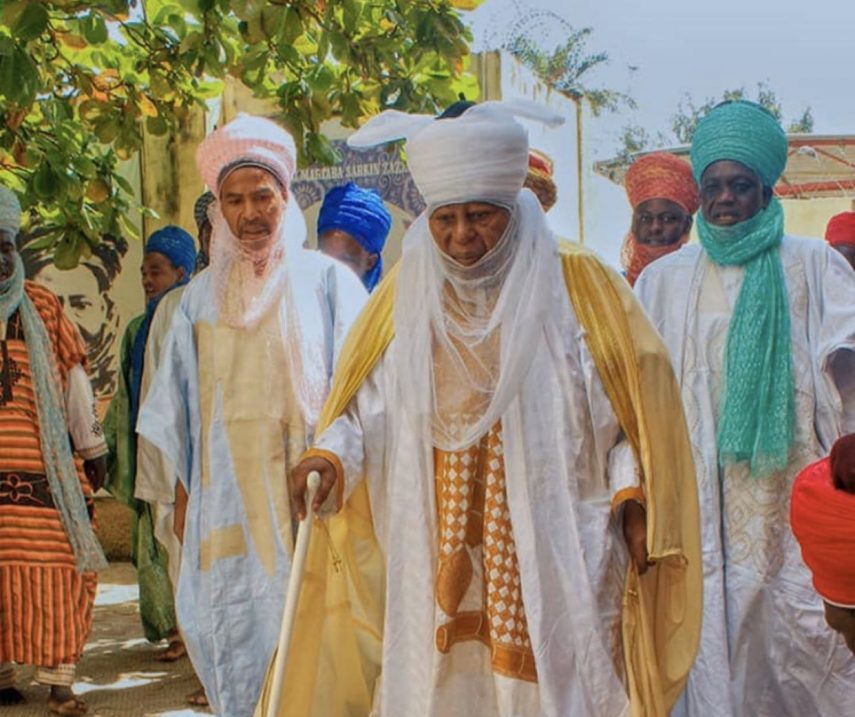Alhaji Shehu Idris, the Emir of Zaria up till Sunday, September 20th, 2020 is gone to his creator. It is in the nature of things for someone to step into his shoes. Who might that be and would he, (because no woman has been an emir before even as Queen Amina retains a place in cultural history of Nigeria) be a return of Shehu Idris, (generally said to be peaceful and humble) or someone who would be vocal in favour of rapid modernization?
The currency of this question can be measured by what is already circulating in chat platforms. It is basically the question on the lips. But it is not possible to satisfactorily answer the poser without looking back at the life and person of the last occupant.
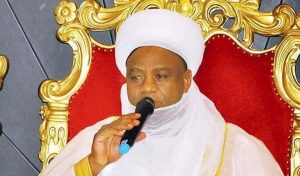
Sultan of Sokoto and the spiritual leader of the Muslim community in Nigeria
As the fourth or so in rank within the Caliphate, the Emir of Zaria is a cultural force to reckon with. The attendance at his burial yesterday, September 20th, 2020 testifies to that. But even that was surprising, coming after the revolt against him in 2011 when he was suspected to be pro-Goodluck/Namadi Sambo regime. It is either that death has made the people to have forgotten everything or there was never really anything substantive in the first case. Or a case of successful neutralization of conflict?
It was against this background that one of the few questions Intervention was able to put to a leading ABU, Zaria Historian of the Zazzau Emirate was what Southern Kaduna as well as the Islamic Movement of Nigeria, (IML), would think of Alhaji Shehu Idris, the deceased emir. The Historian’s reply is that the IML would feel a sense of loss in Shehu Idris. His argument is that the next emir would most likely not be that tolerant. According to him, Shehu Idris did not want sectarian division in his emirate and that this was to the extent that IML used to sit inside his Mosque and preach. He was very tolerant and quiet, came the verdict of the Historian. It is a surprising response because anyone who has lived in Zaria would recall verbal and sometimes physical missiles directed at emiral authority by IMN elements.
The second aspect of the question deals with Southern Kaduna. Intervention was told the departed emir had a title for every identity in the emirate – Igbos, Yorubas, Gbagyi, Ebirra, etc. That, he says, explains the existence of the Kuyambana Zazzau, for example. Although Sociologists of power would say that the creation and offer of traditional titles to selected holders is a strategy of co-optation and control and, therefore, a disciplinary move, our Historian stressed the symbolic gesture it is also all about.
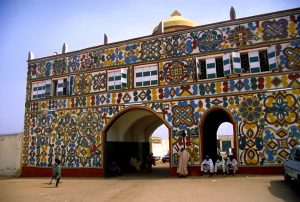
The Palace in Zaria
Specifically on Southern Kaduna, he argues that, as Chairman of the State Council of Chiefs, the late emir must have tried to do a number of things in favour of peace. But he also adds that all moves for peace were, however, usually coordinated by the governor in power. “Most of the emirs are patrons of Miyetti Allah and they must be part of a committee the Sultan created but which the government named. Certainly, the late Emir was part of it and I know they worked for peace because my study of the mechanism is that they all believe that there can be nothing again if there is no peace”, he told Intervention. He also adds how the late Emir was used to coming out to publicly speak against violence in the 1980s and which must have been the origin of his problem with what later became IMN.
Whether the status of a peacemaker accorded the late Emir would satisfy theorists of ‘Fulanisation’ is a different matter. In the midst of killings that no one in authority has convincingly explained, contradictions such as sour relations between the emir and IML or around what happened during the Daniel Saror Vice-Chancellorship of ABU, Zaria are bound to be overwritten by powerful emotions and historical perceptions. That is, historical perceptions that would also not note even the class tension or popular discontent against authority observable around throughout contemporary Northern Nigeria. The idea of a Fulani conspiracy against the rest of Nigeria has, in the context of generalised insecurity under the Buhari regime, become so powerful as to overwhelm nearly everyone and everything.
It all raises the question of who the next Emir of Zaria would be and whether he would be a modernist critique of the departed emir or a case of Alhaji Shehu Idris redux!
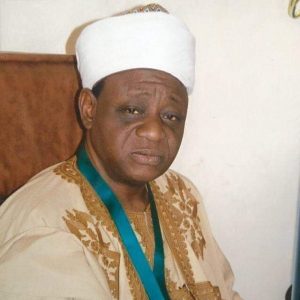
Bashar Aminu: A key contender to the throne
A typical Muslim would argue that it is not possible for anyone to know right now who would emerge eventually even as the pathologies of the succession rituals as well as the most eligible, plausible successors are all well known. Seen and unseen considerations could come in and sometimes dramatically alter the script of even the most powerful actor. Officially, the most powerful actor in this process would be the incumbent governor of Kaduna State, Nasir el-Rufai. But the network of interests connected to emiral authority anywhere in Nigeria would be such that even a largely possessive individualist of a fellow like el-Rufai could be outflanked by undecidability.
There would though be no such undecidability as for this to be a repeat of the emergence of Sanusi Lamido Sanusi in Kano in 2014, more as a result of the in-fighting between then President Goodluck Jonathan and Governor Musa Rabiu Kwankwaso. Whatever self-imagination drives el-Rufai, he is not likely to engage President Buhari in a contest of choice should his preference clash with what the networks of interests may want and for which they may seek the president’s intervention. In that sense, there would be no repeat of Kano in 2014 here.
When the Chief Imam of the Emirate, the Waziri, the Fagaci and three others who make up the kingmakers pick three names from the from among those who submit their credentials, the governor is likely to simply pick one and that is it. This may only not happen if the intensity of the competition is such that the more intelligent thing to do would be to bypass the list from the kingmakers as a way of deflecting unproductive competition. Whether this would come to that is not clear yet. But it is a prized office. So far, contenders from three out of the four ruling houses in the Emirate are obvious to observers. Whether they will all come out as speculated remains to be seen.
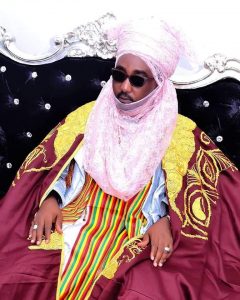
Bamali: the contender to watch
Among these, in absolutely no order, are Ahmed Nuhu Bamali who has just returned from an ambassadorial tour of duty to Thailand. He is a son of a former Minister for Foreign Affairs of Nigeria in the First Republic. He is also a son in-law to the immediate past emir and many in the North speak of him being very close to Sanusi Lamido Sanusi and Governor Nasir el-Rufai. That doesn’t mean he doesn’t have his own self-understanding. He currently holds the title of the Magajin Garin Zazzau which could be a weapon in the event of a deep tussle for the throne because the title could be inferred in a talented manner to mean the next in line or successor. In the politics of the palace, ward heads could or, in fact, report to him.
There is Iyan Zazzau, Bashar Aminu, the son of the Emir of Zaria from whom the late emir took over in February 1975. He was reportedly very close to the late emir, all two of them coming from the same dynasty – the Katsinawa Dynasty. There are three other such ruling houses in the Emirate – the Sullubawa; the Barebari and the Mallawa. Again, this listing follows no ordering.
Lastly, there is Manir Jaafaru, a well known name, having been a Commissioner for Information and head of a major federal parastatal during the IBB era. To his credit in terms of influence is his connection to the IBB circuit. Jaafaru is from the Barebari Dynasty.
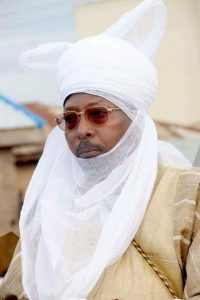
Jaafar Munir: another contender to watch!
But this list is certainly not exhaustive. There are the children of the late emir. They might not enjoy the prominence of some of the contenders but they have obviously been actors in the politics of power in the palace.
As indicated earlier, some people are already voting in their own circles, indicating who is going to get it and why. Some of the reasons given for such position include his being the Magajin Gari which is considered the next most important to that of the Madaki; his Mallawa Dynasty not having had it for a long time now and so on and so forth. There is no knowing if such sentiments would be decisive at last as others have similar, good looking reasons. For instance, there are those pointing at Turaki, the eldest son Of Shehu Idris and who think he should have it. Until there is a new Emir, any contender is a potential emir and those who say that God is the ultimate decider of some of these things must just be 100% right on that. Till then, it is a waiting game!
All these make compelling, the question of why otherwise well educated, super rich and well connected members of the elite would want to become traditional rulers who are, theoretically, under the authority of local government chairmen. Till date, it is only Prof Bolaji Akinyemi and Chief Audu Ogbeh who have said or whom we have heard declining becoming traditional rulers in one way or another. Not long ago, the Tiv took a British educated Professor of Biochemistry and made him the Tor Tiv. Is it the case that we are not teaching African Politics properly in our universities or that the modern elite seeking to be traditional rulers are manifesting banality? Or, is it just the case that the old order dies hard? That is, instead of withering away, the traditional authority simply reformed itself to the chagrin of modernists?

